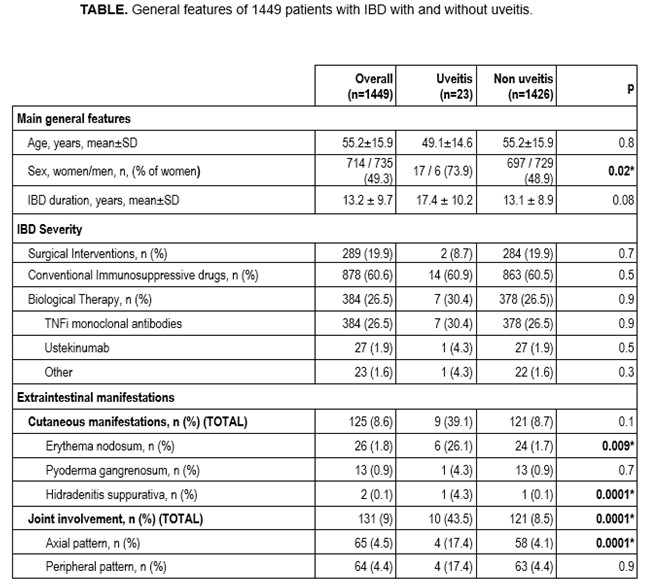Session Information
Date: Monday, November 8, 2021
Session Type: Poster Session C
Session Time: 8:30AM-10:30AM
Background/Purpose: Inflammatory bowel disease (IBD), which includes Crohn’s disease (CD), and Ulcerative colitis (UC) are related to Spondyloarthritis (SpA). Ocular manifestations (OM) are well-stablished in axial SpA but not in IBD. It has been classically reported that whereas uveitis with axial SpA is predominantly anterior, unilateral, acute, and non-recurrent; in IBD it is bilateral, posterior, insidious, and chronic.
In a large unselected series of IBD, our aim was to assess a) epidemiology and clinical features of uveitis associated to IBD, b) to compare patients who developed uveitis and those who did not, and c) its relationship with biological treatment used in IBD.
Methods: Study of all consecutive patients from a single University Hospital during the last 40 years with: a) IBD (CD and UC), and b) uveitis according to Standarization Uveitis Nomenclature (SUN) Working Group. Demographic features, clinical findings, occurrence of other extraintestinal manifestations and treatment were recorded.
Results: We studied 1449 (714 women/735 men) patients with IBD, mean age of 55.2±15.9 years.
Uveitis was present in 23 (1.6 %) (38 eyes) of 1449 IBD patients. The most common pattern of uveitis was typically anterior (n=18; 78.3%), unilateral (n=19; 82.6%), acute (n=19; 82.6%), and non-recurrent (n=12; 52.2%).
The comparative study between patients with and without uveitis showed a significant predominance of women (TABLE) in patients with uveitis, as well as erythema nodosum, hidradenitis suppurativa and joint involvement.
Regarding IBD severity, in terms of surgical interventions, and conventional and biological immunosuppressive treatments, there were no significant differences.
Conclusion: Although uveitis is more infrequent in IBD than in axial SpA, it is also anterior, unilateral, acute, and non-recurrent in contrast with published data from selected series. Patients with uveitis do not seem to represent more severe phenotype of IBD.
To cite this abstract in AMA style:
Sánchez-Bilbao L, García-García M, Martinez-Lopez D, Gonzalez-Mazon I, Rivero-Tirado M, Castro B, Crespo J, gonzalez-Gay M, Blanco R. Uveitis and Inflammatory Bowel Disease: Study of 1449 Patients from a Single University Center [abstract]. Arthritis Rheumatol. 2021; 73 (suppl 9). https://acrabstracts.org/abstract/uveitis-and-inflammatory-bowel-disease-study-of-1449-patients-from-a-single-university-center/. Accessed .« Back to ACR Convergence 2021
ACR Meeting Abstracts - https://acrabstracts.org/abstract/uveitis-and-inflammatory-bowel-disease-study-of-1449-patients-from-a-single-university-center/

